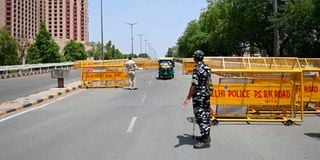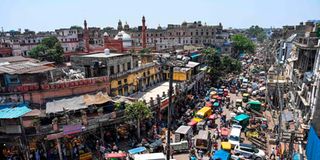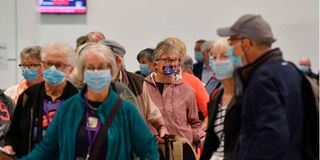India locks down capital to battle Covid-19, US hits vaccine milestone

Police personnel stop vehicles at a checkpoint during a weekend lockdown imposed by the government amidst rising Covid-19 coronavirus cases, in New Delhi, on April 18, 2021.
What you need to know:
- New Delhi Chief Minister Arving Kejriwal said businesses would be shut and movement around the city of 20 million limited to essential services.
New Delhi,
India will lock down its capital New Delhi for a week from Monday night to try and control a raging coronavirus outbreak.
Infections are skyrocketing in India, however, with hospitals running out of beds and the government forced to reimpose economically painful restrictions again.
Delhi Chief Minister Arvind Kejriwal said the capital's "health system is at a tipping point".
"If we don't impose a lockdown now, we will be looking at a bigger disaster."
Kejriwal said businesses would be shut and movement around the city of 20 million limited to essential services.
The week-long total lockdown comes after the capital recorded more than 25,000 Covid-19 cases in a single day.
New Delhi on Sunday recorded the biggest jump in its daily Covid-19 tally with 25,462 new cases, while the positivity rate shot up to 29.74 per cent .
This means that almost every third sample being tested in the city is turning out to be positive.
Announcing the lockdown from 10pm Monday to 6pm next on April 26, the chief minister said, "I appeal to you with folded hands. It's a small lockdown ... only for six days. Don't leave Delhi."
"I'm very hopeful that we won't need to extend the lockdown. The government will take care of you," he told a press briefing.
The official acknowledged that “Delhi’s health system is stretched" and that there is a shortage of medicines such as Remdesivir.
"The lockdown period will be used to arrange for oxygen and medicine. I request everyone to follow the guidelines," he said. “I always say all of Delhi is like a family. Even [this] we will face together. We have won [before]. We will win again."
He said the government will also make arrangements for more ICU beds.

People make their way along a street in the old quarters of New Delhi on April 19, 2021, as India's capital prepares to impose a week-long lockdown due to a surge in Covid-19 cases.
World's second-highest caseload
The vast nation of 1.3 billion people reported a record high of 273,810 infections on Monday -- the fifth consecutive day of more than 200,000 cases.
The restrictions followed similar measures in other parts of India, including in the western state of Maharashtra, home to financial capital Mumbai.
The surge has overwhelmed the healthcare infrastructure in many parts of India, and authorities are scrambling to free up hospital beds and secure additional supplies of oxygen and treatment drugs.
India has the world's second-highest caseload with more than 15 million known infections.
Health workers are bracing for yet another spike as millions of pilgrims attend a religious festival and ongoing regional elections draw huge rallies.
The UK government said Monday Prime Minister Boris Johnson's visit to India has been cancelled over the Covid-19 surge there.

A man receives the Johnson & Johnson Covid-19 vaccine at the International Union of Operating Engineers Local 399 union hall vaccination site in Chicago, Illinois, on April 6, 2021.
US milestone
Meanwhile, the hard-hit United States has passed a hopeful milestone of giving at least one Covid-19 vaccine dose to half its adults.
There was good news from Australia and New Zealand as well, as the two neighbours opened a travel bubble that would allow people to travel without a mandatory quarantine.
The coronavirus has killed more than 3 million people, devastating the world economy and upending daily life since emerging in China in late 2019.
The United States remains the hardest-hit nation, with more deaths and known infections than anywhere else, but it passed a major vaccine milestone on Sunday with roughly 130 million Americans -- half its adult population -- receiving at least one dose.
The country is a world leader in vaccinations, and all its over-18s will be eligible for a shot from Monday.
But its top pandemic advisor Anthony Fauci warned Sunday that the United States remains in a "precarious position".
"We're having a seven-day average of over 60,000 new infections per day. That's a place you don't want to be," he said.
"We also have to make sure that people don't throw caution to the wind and declare victory prematurely. That's not the time to do that."
Neighbouring Canada illustrated the threat of a fresh coronavirus wave, as authorities scrambled to funnel additional health staff and equipment into virus-hit Ontario to battle a surge in infections.
Ontario is Canada's most populous province, and record cases are threatening to overwhelm its healthcare system.

Passengers wait at the check-in counters for New Zealand flights at Sydney International Airport on April 19, 2021, as Australia and New Zealand opened a trans-Tasman quarantine-free travel bubble.
Restrictions easing elsewhere
Some countries have started to ease restrictions despite concerns about new outbreaks, hoping to resume some social activities and kickstart their economies.
Portugal was set to allow restaurants, shopping centres, high schools and universities to reopen from Monday.
Switzerland was also set to start the week with a step towards normality, with outdoor seating permitted at restaurants and bars and cinemas, sports facilities, and in-person classes at universities re-opening.
And in Australia and New Zealand, there was joy and celebration as a long-awaited quarantine-free travel bubble opened across the Tasman Sea.
Family members tearfully reunited at airports in Sydney and Wellington, while others readied for their first outbound flights in more than a year.
"(I'll) yell, scream, cry, hug, kiss, (feel) happy -- all of these emotions at once," Denise O'Donoghue, 63, told AFP as she prepared to board her plane in Sydney.
"What normal's going to be from now on I don't know, but I'm just really, really excited today."






